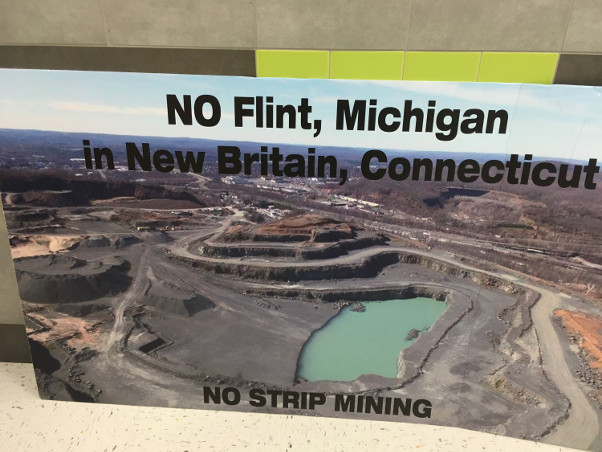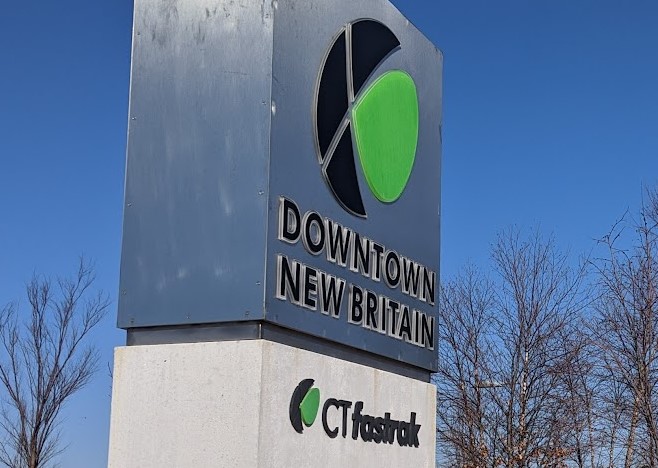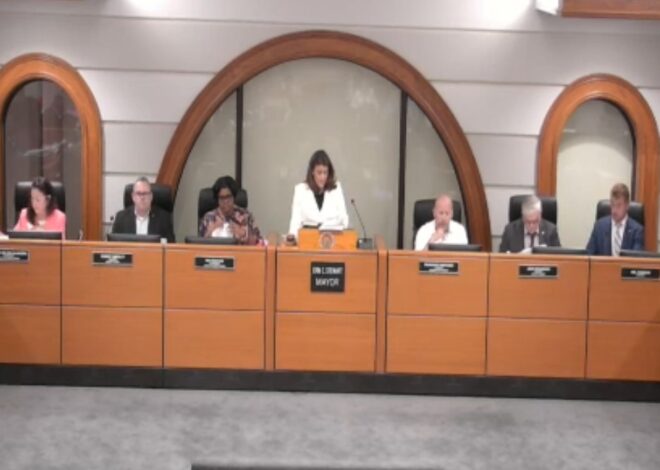The City Council has approved a resolution seeking a refund from the engineering firm hired to produce a study that was done as part of Republican Mayor Erin Stewart’s plan to allow strip-mining on New Britain’s protected drinking watershed land.
The Council is seeking a refund of $354,500 from Lenard Engineering for the study.

In a separate resolution, the Council also voted to, “require the removal of Lenard Engineering from any and all on-call service lists within any City Department.”
“On-call” services are contracts allowing city departments to hire firms for services without a formal bid for each job. They are typically for smaller jobs.
The two resolutions were taken up at the September 26, 2018 Council meeting. The votes on both were nine votes in favor and six opposing.
Report called “inadequate”
Both resolutions include discussion that the Lenard’s report, related to the watershed mining proposal, was inadequate.
The resolution seeking a refund says that $337,000 was requested on June 22, 2016, “to conduct appropriate water supply and environmental studies, surveys, and field investigations regarding the Tilcon quarry expansion and for Lenard Engineering to supply the results of such study.”
That resolution goes on to say that, “on December 14, 2016, Resolution No. 33540-1, allowed for Lenard Engineering to conduct a Four Season Ecological Study of the Utilities Division’s Reservoirs and Properties for an additional $17,500.”
But that resolution goes on to say that, “State of Connecticut Water Planning Council as well as the Council on Environmental Quality found the report submitted by Lenard Engineering to be inadequate,” adding that, “the full Four Season Ecological Study was not completed and only a Two Season Study was concluded.”
City water utility director Ray Esponda, responding to a question by Ald. Wilfredo Pabon (R-1) on the resolution to remove Lenard from the city’s on-call lists, said that the firm fulfilled its contractual requirements related to the watershed mining study.
But local attorney Paul Zagorsky, in the meeting’s public speaking session said, “You don’t pay $354,000 for a study that is inadequate and incomplete.”
“If you don’t question that, then I have some serious problems as to whether we are acting in a fiscally responsible manner,” Zagorsky said to Council members. He added, “You sure as heck don’t reward the people for doing a lousy job by giving them more work.”
Criticism of watershed mining plan and report
The city had hired Lenard Engineering, Inc. (LEI) to provide what had been purported to be an independent evaluation of the water quality and environmental impact of the mining plans.
But, Zagorsky wrote in a 2017 letter to the editor published in the New Britain Herald,
The lead study consultant for LEI who has done work for the city since the 1990s, in communications with Tilcon’s president stated he’s looking forward to “working with you on this project,” and to “getting this fast-paced project underway.” That the kickoff meeting to “discuss the quarry project” (LEI’s words) was hosted by Tilcon’s president and four senior Tilcon personnel, with the study sub-contractors, Mayor Erin Stewart, Gil Bligh of the Water Department, and Tilcon lobbyists and public relations people in attendance is a concern.
The watershed mining plan has faced significant public opposition.
The plan was met with huge opposition at the public hearing held on June 26, 2018 in front of the City Council and the Board of Water Commissioners.

Speaker after speaker at that hearing spoke in opposition to the plan at a packed event in the auditorium at Gaffney Elementary School. Speaker after speaker in opposition to the plan was loudly applauded by the large crowd.
Official rebuke by state commissions
In August, the Water Planning Council (WPC) and the Council on Environmental Quality (CEQ) slammed Stewart’s watershed mining plan.
The study done by Lenard on behalf of the city presented underpinning of a case Stewart had put forward for mining of drinking watershed land as a way to create a new “storage reservoir” for the city.
But the two state commissions concluded that, “that the need for the proposed new reservoir has not been substantiated and based upon their separate reviews both the WPC and the CEQ find that the proposal’s risks to the current public water system and the environment are significant. Thus, both the WPC and CEQ are opposed to the City of New Britain’s proposal for the proposed quarry expansion and future water storage reservoir.”
Stewart withdrew her watershed mining proposal just two days before final approval of the recommendations by the two state commissions containing the highly critical rebuke of her proposal.
Future actions on the resolutions
Under the resolution seeking a refund from Lenard, Stewart would be required to report back to the Council, “in regards to the progress of the refund request.”
But before either that resolution, or the resolution to remove Lenard from the city on-call lists can take effect, the proposals go to Stewart for her signature or veto.
If Stewart vetoes the resolutions, the Council can re-approve them, over the her objection. However, such a veto “override” requires “yes” votes from ten of the fifteen members of the Council.
Since Republicans hold six seats on the Council, if they all vote with Stewart, they have the power to deny the ten votes required for a veto override.
Stewart has ten days to approve or veto the resolutions.




